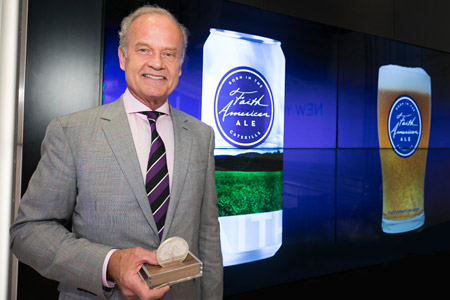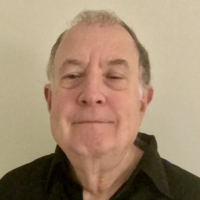So it turns out it was actually Frasier Crane, the effete and pretentious psychiatrist, and not his fellow “Cheers” barflies Norm Petersen and Cliff Claven, who was the true beer lover on the beloved sitcom. Well, maybe not Dr. Crane, but that label certainly applies to the actor who played him.
Kelsey Grammer, who spent 10 seasons playing Frasier Crane on “Cheers” and 10 more on the equally successful, commercially and artistically, spinoff “Frasier” was in Atlantic City last weekend to fly the flag for Faith American, the craft beer brewery, named for his daughter, he created in upstate New York in the middle part of the last decade.
Philadelphia Weekly had the opportunity to chat up the four-time Emmy winner before the first of several public “guest bartender” appearances he made during his weekend stay at Hard Rock Hotel Atlantic City – which also included a Karaoke session at the Hard Rock Café during which he performed songs by The Beatles and Frank Sinatra. If that surprises you, you probably never watched “Frasier,” because Grammer’s ability to carry a tune is so well-known he sang the show’s closing credits theme song.
Grammer, 67, who impressed social-media denizens with his friendliness and accessibility during his stay, spoke about, among other things, his brewery, the planned “Frasier” reboot for the Paramount+ streaming service, and being a political conservative in liberal Hollywood.
Philly Weekly/Chuck Darrow (PW): What was the first beer you ever had?
Kelsey Grammer (KG): The first beer I ever had? It had to be a Pabst Blue Ribbon. I think it was when I was in New Jersey.
PW: Are you from New Jersey?
KG: Yeah. I lived in a town called Colonia when I was four and moved to Rumson/Atlantic Highlands and lived there for a couple of years and then we moved to Florida and I spent my high school years in Florida. In Florida, I drank Busch beer all the time.
PW: How did Faith American happen?
KG: My adventure with beer began with this property I bought in upstate New York. We used to go to Thanksgiving in upstate New York every year, in Kingston. And about 45 minutes from there was this piece of land I found in the back of…duPont Registry magazine. And I thought, I’m gonna go look at it. And if I like it, I’m buying it.
PW: Was it with the intention of creating a a brewery?
KG: No, no, no. There was a piece of land next to it that had a giant abandoned barn on it. It was big as a football field and had been a pretty dynamic dairy farm. And I thought, boy, something’s gotta happen here. But I don’t wanna be a dairy farmer. I don’t wanna milk cows twice a day. So the beer idea was hatched, and then I started to think, well, what do I like about beer? What don’t I like about beer? I mean, honestly, I don’t like a lot of what they’re doing to beer these days, because it’s too niche-y. A lot of it is not drinkable as far as I’m concerned. It’s not really beer. It’s like, it’s some sort of a bizarre self-flagellation: “Let’s see how nasty we can make this taste and then pretend we love it.” So I know that there are people that really do love beer like that, but for me, it’s like drinking varnish. So I thought let’s start with a nice blonde Belgian ale and make it refreshing with a little bit of a hoppy finish. And that’s exactly what we ended up with for our first beer, which was Faith American ale.
PW: So was that 2015?
KG: Yeah. And we probably had our first beer around 2017. We did a couple of sort of spot checks and had people taste it and they really liked it, but we didn’t really have great distribution at the time.
Then [in early 2020], I introduced it to friends in Vegas, and they said, “We’ll do this.” And then we opened up with a charity event with the beer on the table, and a week later, everything shut down [due to COVID]. So I just thought, well, let’s just regroup, pull our horses back. So we put everybody back in the barn and came up with a couple of more flavors over that time. And last summer we started to [slowly distribute the beer].
PW: How many different beers do you have?
KG: We have three right now [the Belgian blonde, Calico Man IPA, and Hazy Blue, billed as a “New England style” IPA]. I can’t imagine I’m gonna do more than about six flavors as a rule, maybe rotate one or two seasonal. But that’s not that important to me. They’re all drinkable, good beers that you can drink any time of the year.
PW: How involved are you? Are you the celebrity front man, or are you up there involved with the business?
KG: It’s my baby. I sniff a lot, but I do more. I’m not a brewer per se. I didn’t study brewing or the chemical process involved, but I’m a taste-tester, I guess. I say, “This is what I’m looking for.” And I’ll talk to the brewers and I have a couple of guys we’ve been working with and I’ll describe what I think it ought to be. And they’ll say, “Well, that sounds reasonable. Let’s, let’s give that a try.” And if it sounds ridiculous, they’ll say to me, “No, we can’t do that.”
PW: Where’s it available?
KG: It’s available in almost all the counties in New York and New Jersey. There are a couple of counties in New York that we haven’t quite covered. We just are now opening up South Jersey through Kramer Beverage and [the Hard Rock] event. So this is sort of a launch pad for South Jersey.
PW: So it turns out that it was Frasier who was the beer guy.
KG: Yeah. Right. That’s sort of funny.
PG: Which is my clever way of segueing to the “Frasier” reboot. Where do we stand with that?
KG: I think I’m getting a rewrite on the first script tomorrow.
PW: Is there anything that you can tell us about it?
KG: No. That’d be terrible to let out. Let’s just say he’s not going back to Seattle.
PW: What was it that convinced you that this was something to do at this time?
KG: “Roseanne” came back and I watched it a couple of times and I thought, well, that’s pretty good. That’s still a good show. And she’s still funny. And I know she went through her whole thing and got canceled, but she’s a wonderfully funny person. And it was great to see that that would still be appealing to people. And then I thought, well, they did “Will & Grace” and they didn’t change it at all. And that’s kind of interesting: They just sort of stayed in sort of a golden tube or whatever, and popped back into our minds. And I thought, if there’s another “Frasier,” he’s gotta change. It’s gotta be 20 years later basically. And he’s gotta have the next chapter. It has to be an Act Three. And we have hit on something that I think is actually really significant and, pertinent to the character, but also relatable and funny and all the things that comedy should be.
PW: Historically speaking, lead characters on sitcoms tend to be “everyman” types in order for the public to relate to them on some level. Frasier Crane hardly fits that description. Why does he resonate with people?
KG: Well, we were unapologetically playing up to our audience at all times. There was never a time we thought we needed to explain something to them or talk down to them. The only other comedian I know who did it was Jack Benny. And that was the difference. I was basically inspired by Jack Benny.
PW: You are one of the higher-profile celebrities on the conservative side of the political spectrum. Has that impacted your relationship with the entertainment industry, which tends to lean left as a rule?
KG: Oh gosh. I hope not. My relationship with Hollywood is always a bit of an arm’s-length thing anyway. Because it’s Hollywood; it has nothing to do with anything else. It’s got a glamorous veneer to it, but the underbelly has a lot of despair as well. And I don’t want to participate in that part of the community. I just asked for the opportunity to do great work and I’ve been given that opportunity a lot. Maybe there’ve been some opportunities that’s passed me by because of something that’s personal or political, but I don’t give a shit.





